Seafarers working onboard cruise ships and ferries are the unhappiest in the shipping industry, the latest Seafarers Happiness Index report reveals for the second quarter of 2019. Overall, seafarer happiness has slipped this quarter, down to 6.27/10 from 6.31.
The report, issued by charity The Mission to Seafarers and insurer Shipowners’ Club, is based on the responses of thousands of seafarers across the global maritime industry.
The latest report showed that cruise and ferry crews had an average score of 5.3/10 on their general happiness level – 15% less than the global average across all vessel types, which stands at 6.27 this quarter.
Happiness levels for those working on tankers, bulk carriers and container ships were all close to the global average, coming in at around 6.3/10.
Seafarers on dredgers were the most satisfied, according to the data, but statistically made up a very small sample.
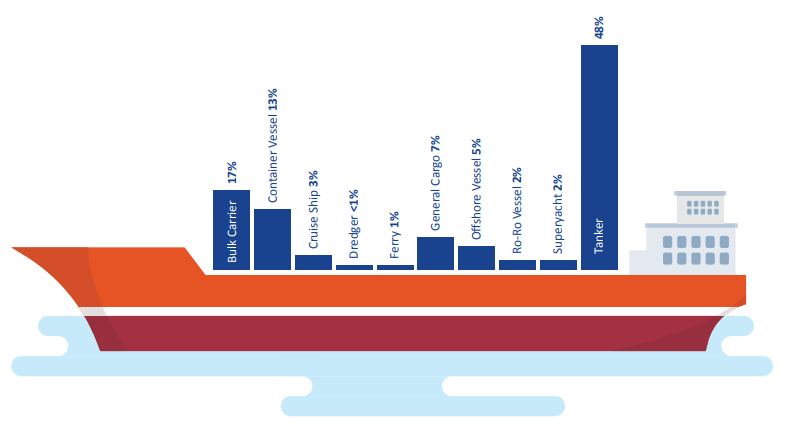
Second Engineers tended to be the lowest scoring, whilst in general the deck department appears to be more satisfied than the engine department, and meanwhile catering staff are reportedly in a rather low state of happiness.
There was also great cause for optimism in the report, as cadets scored very highly, a staggering 8/10, the highest figure ever reached across the Index.
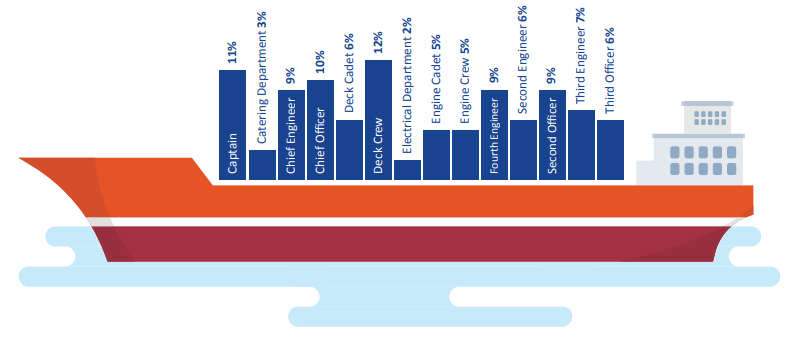
Younger seafarers tended to be the happiest, with those in the 25-35 age range the least satisfied.
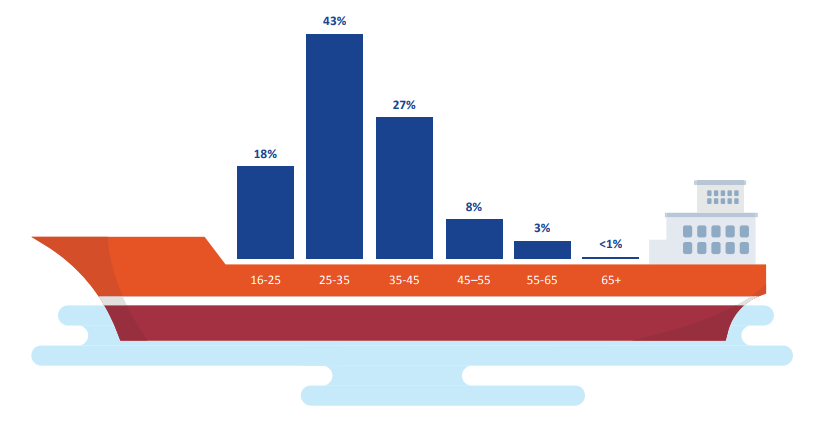
Geographically, the happiest seafarers were from Oceania, closely followed by those from North Asia.
Over 93% of respondents were male, and whilst only a small percentage of returns, those women who did share their verdicts on their happiness at sea were only marginally less satisfied than their male counterparts.
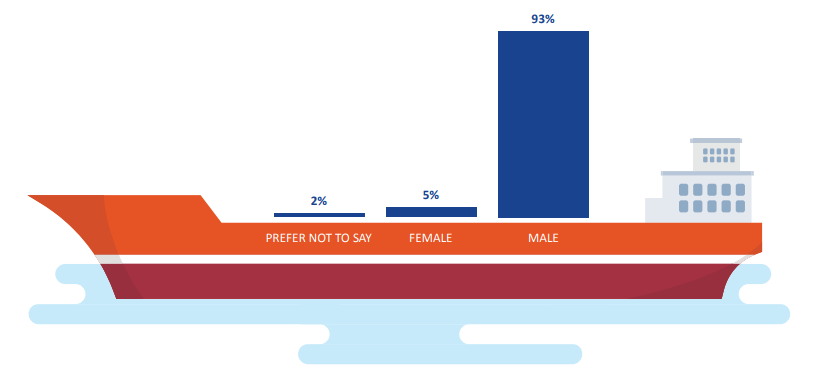
On the positive side, happiness levels among seafarers with their ability to keep fit and healthy onboard also rose. In responding to the survey, a number of seafarers also highlighted the importance of physical exercise as a factor in mental wellbeing.
Four key issues emerged Across all vessel types, four key issues emerged from the survey responses in this three-month period: How happy generally when at sea? -> 6.21 ↑ from 6.03 There were a number of respondents who felt frustrated about the focus of those working ashore. They also questioned the approach of focusing on “wellness at sea”. There were concerns that fixating on seafarers’ ability to cope with the bad aspects of the job is not enough; we should be fixing the problems not how we deal with them. It was also claimed that as seafarer abandonments are making headlines, the whole mechanism for making life better for seafarers is struggling to cope with an industry in which bad owners can still get away with terrible behaviour towards crews. How happy with your work load? -> 5.73 ↓ from 5.99 This question has seen another big fall and seems to tumble every quarter. There is no getting away from the sense that excessive paperwork is something of immense frustration to crews. There was criticism of the hours of rest too, as the data which is logged is often falsified. More than that, even where seafarers can step away from duties, there is no guarantee that they are actually “rested”. The same routines, the variable quality of cooks and provisions, lost sleep as the ship is rolling, or the pressures of port visits – time in a log does not always reflect the reality. Another issue was that of interaction with office staff. Seafarers saw themselves increasingly as “adjunct to the office desk”. Indeed, office staff seemingly hardly even think of crews as remote, they are simply seen as a resource to be used when needed, regardless of time differences or watch patterns. There is also concern over seafarer’s ability to “switch off” on leave, and a number said that their manning departments were chasing them about going back to sea almost as soon as they got home. How happy about the training you receive? -> 6.53 ↓ from 6.63 The issue of training saw a fall this time round. There were concerns raised about the way in which training has become something of a tick box. There were disparaging comments about the approaches taken. One respondent sarcastically stated, “No one on our vessels will die in a confined space. We made them all watch a twenty-year-old video about it. Job done; box ticked.” The tick box mentality is one which caused concern for a number of Seafarers Happiness Index respondents. The pressure is to simply complete training, not so much on actually learning and improving performance. There were also frustrations about the changing perceptions from offices ashore. There is an irony that seafarers are meant to be focused on safety culture, but there is a perception that this is actually hung on cost rather than keeping crews safe. How happy about interaction with other crew onboard? -> 6.85 ↓ from 6.95 While satisfaction in this section has usually held strong, this time round there is a fairly substantial fall and some of the reasons come loud and clear from the seafarers who responded. Isolation was a word that was repeatedly used to capture the sense of how seafarers feel. There are crew who feel remote, out of touch and very lonely indeed. The only succour is often internet access and there are of course some who claim that retreating to cabins only helps perpetuate the problem. However, this is not how seafarers see it. They do not see being online as the issue, they see the problem as a lack of people, a lack of time and work pressures. There is so little wriggle room with crewing levels that there is not sufficient space or time for social bonds to develop. This makes it incredibly hard, if not impossible to really interact well. The team mentality and approach which has made seafaring a profession of camaraderie, support and even enjoyment has been decimated and eroded. Seafarers are simply emotionally limping through their contracts to get back home. They do not expect the friendships of old, they do not anticipate enjoyment, and that further exacerbates the retreat into isolation and loneliness. There were also reports of increased tension onboard, even violence and aggression. How happy about access to shore leave? -> 5.97 ↓ from 6.16 “Shore leave is dead. Never will it be seen again”. That was the stark assessment of one respondent, and with so many issues surrounding the seemingly simple notion of leaving a ship for a short break, it is perhaps hard to argue with them. Hectic port stays and ramped up duties mean that many seafarers feel they cannot go ashore. There are so many inspections to be completed, as well as audits, maintenance and all manner of visitors to satisfy, as well as the small matter of cargo work. This means that not only are some senior officers loathe to grant time off, but many seafarers simply feel they cannot be bothered with the hassle. The shore leave Catch22 seems to be that if there is enough time during a port stay to leave the ship, then invariably it will be difficult to get from the ship to the gates, and perhaps even more so to actual downtowns. How happy about wages/salary? -> 6.23 ↓ from 6.30 For the majority of past Seafarers Happiness Index reports, there was a sense of begrudging acceptance of wage levels. However, this time round it felt somewhat different. There were a number who stated that they felt the tough life of a seafarer needs to be better compensated, points which were made in very robust language indeed. Then too was the fact that the nationals of one country point the finger at those of others, or whole regions. There were a number of respondents who felt that wages were all too often driven down by the willingness of some nationalities to accept lower wages. Unfortunately, the global nature and the freedom with which owners can access crews means that this has always been the way. Again, there was mention of the issue of non-payment of wages and the fact that this is all too common. There were crew who had experienced delays and faced real frustrations whilst their families suffered privations at home. There were also a number who were fretting over ever receiving their pay. “Is it right in the 21st Century for seafarers to worry about being paid?”, one asked. How happy about the food onboard? -> 6.34 ↓ from 6.47 As in other Index reports, this time saw the usual issues of cultural sensitivity. Seafarers of a range of nations claimed that cooks are simply not capable of making the food which means so much to them. Obviously, vessels are increasingly multicultural, but it seems that time and time again that cooks are either not trained, aware or resourced to prepare the food which seafarers want. Even where the quality of ingredients seems adequate, and where there are no nationality issues, all too often cooks seem to take shortcuts. How happy about your ability to keep fit and healthy on board? -> 6.45 ↑ from 6.29 There was a surprising rise in the figures for this question, as this is usually one that has tracked a downward trajectory. The comments this time round, however, do capture many of the frustrations that have been voiced before. There are many ships that only have minimal or no gym equipment, while there are those ships which do, but the work load is so heavy that seafarers feel they don’t have the time to use them. How happy about contact with family when at sea? -> 6.88 ↑ from 6.79 There was a positive result here, as the issue of connectivity seems to have improved. This is hopefully to do with the ever-increasing number of deep-sea vessels which now have internet onboard. Something which many respondents stated, “is a big help”. On ships without access, or where there are draconian usage restrictions, then the happiness of these seafarers is affected. Lack of facilities, expensive or slow connections make life incredibly frustrating for crew, and they voice their disdain for companies who do not provide what they want in fairly strong terms. Time and time again, seafarers stated that “communications with loved ones is essential, even if it is only for a couple of minutes a day”. How happy with welfare facilities when you are ashore? -> 5.50 ↓ from 5.53 Seafarers are not as happy with welfare facilities ashore as they would hopefully be. As with anything though, statistics do not always tell the whole story. Indeed, many seafarers who scored low on this question, were expressing their frustrations at not actually getting the shore leave to visit centres. Those who did speak about the centres they had visited tended to paint a very positive picture of their experiences. The Mission to Seafarers said it is working hard to address the issues, whether that involves ensuring there is sufficient access to centres or working to ensure that seafarers can access shore leave. Explore more herebelow: In its Seafarers Happiness Index figures for the first quarter of 2019, the Mission revealed lack of government support as a new concern for seafarers. The Mission to Seafarers has launched a new website to act as a repository for the data collected during the survey, in order to create an open framework for improvement which shipping companies can adhere to in order to build a sustainable workforce. See more here.
































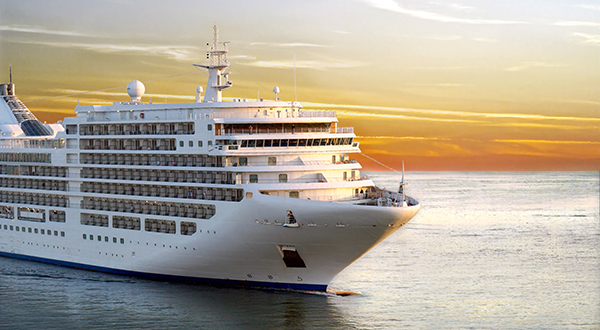
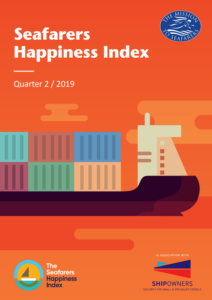






























Most of the time the government is not involved in the crew happiness on seafarers. So the companies manipulate the law specifically regarding the wages work hours health n compensation etc . The seafarers contract has never been revised for past 20 years according to my knowledge. Special with Malta flag registration so nobody care .2009 the salary was the same as it is now so who’s fault it is.